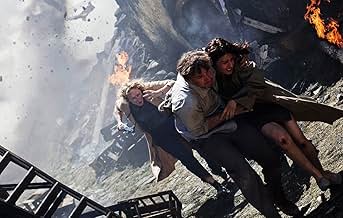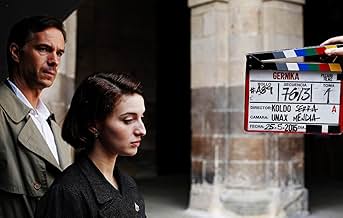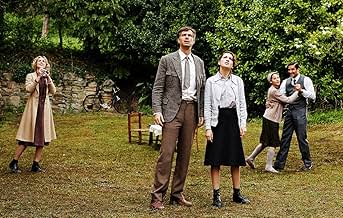Aggiungi una trama nella tua linguaDuring the Spanish Civil War in 1937, an American journalist's fate intersects with that of a Republic censor increasingly outraged by restrictions on what correspondents can report.During the Spanish Civil War in 1937, an American journalist's fate intersects with that of a Republic censor increasingly outraged by restrictions on what correspondents can report.During the Spanish Civil War in 1937, an American journalist's fate intersects with that of a Republic censor increasingly outraged by restrictions on what correspondents can report.
- Regia
- Sceneggiatura
- Star
- Premi
- 5 candidature totali
- Márta
- (as Ingrid García-Jonsson)
- W. von Richthofen
- (as Joachim Assboeck)
- Man in the Crowd
- (as Juan Carlos Judite)
- Woman in the Crowd
- (as Eli Hernández)
Recensioni in evidenza
To really understand the movie, you should know a bit about this war--things you may not clearly understand when you watch. In 1936, the Spanish people elected a socialist government (often called 'Republicans'). However, a coup soon broken out when right-wing nationalist generals decided to depose their leader and create their own government. It wasn't a quick nor easy process, however, and the bloody war raged on for several years. Soon the Soviets began aiding the government and the Axis powers (Germany and Italy) began sending support to help General Franco and his Nationalist forces ultimately win the war. The destruction of the town of Guernica by the Luftwaffe was soon made famous by Picasso's enormous mural named after this city.
When the film begins, Henry (James D'Arcy) is an American news correspondent who working in Spain during this war. He soon finds frustration in covering the events, as often the Republican Spanish government heavily censors his stories--making them, essentially, bland propaganda. What he doesn't realize is that the Soviets advisers in the country are essentially running both this propaganda campaign as well as a Stalinist system by which 'enemies of the state' are ruthlessly purged...whether or not they are guilty of anything. Because Henry has a habit of stepping on toes, he soon is the subject of one of these purges...and this ends up not only affecting him but his lady, Teresa (Maria Valverde). But just as this trap is sprung, the infamous bombing begins.
While this is a romance, I must emphasize that the romantic portion is not primary. Additionally, the plot will not satisfy romance junkies--it doesn't follow the formula of a romance and is more tragic than heartwarming. Instead, the film is more about the events leading up to the carpet bombing of the town of Guernica as well as a vivid recreation of this...and this fictional romance is woven into this. History junkies, however, will be happy with this choice in focus, as the film did an excellent job trying to get the look right of the German planes, uniforms and costumes. It also didn't portray either side as the good guys or bad guys--a mistake many films often make when they discuss the war. Think about it...Stalin on one side, Hitler and Mussolini on the other! About the only thing that didn't work for me in the film was having Henry knowing absolutely no Spanish...none...which was very odd for a news man living in Spain and investigating what's going on in the war. Odd...but not a serious problem with the film. Overall, an interesting and occasionally powerful film about a seldom discussed topic.
The film suffers from poor direction, wooden performances, and a script which is both confusing and unfocused; featuring an implausible love story that's tacked on to make the "historical" part of the film more personal.
The film is pure fascist propaganda; produced to vilify the democratically-elected Republican government. The film attempts to blame the causalities of the bombing on the Republic's news censorship; Shifting the blame away from the Germans. In essence blaming the victims. However, the Spanish government had no prior knowledge that the Germans planned to raze the city of Guernica to the ground. The Nazis didn't advertise their war plans. German Nazi soldiers are depicted as ordinary men just carrying out orders; while the democratically-elected Republican government officials are shown as evil, devious men beholden to the Soviet Union setting up innocent people for incarceration and torture.
The Republic needed every man and woman it could use to fight the Fascists. The barbarians were literally at the gates. It had no time or interest incarcerating innocent people when real enemies of the state existed; paid mercenaries known as 5th columnists trying to take down the country from the inside. Many young men throughout the world volunteered to serve in Spain; fighting to save the world from Fascism, such as the Abraham Lincoln brigades from the US. This film is an affront, not only to the democratically-elected government of the Republic in Spain, but to the thousands who fought and the thousands who died fighting against Fascism. Long live the memory of the Spanish Republic!
Meanwhile he sort of falls for Teresa who is one of the censors, but her Soviet boss, Vasyl (Jack Davenport) is also romantically committed to her and does not take kindly to the dalliance. We also have the brilliant Burn Gorman playing a NKVD agent who is deliciously ruthless (great piece of casting too) and he brings some welcome spice to the proceedings. What follows are the events that put Guernica on the map – 'for all the wrong reasons'.
This is a really well made film with some great performances (accents aside) and high class CGI and a nice attention to detail. The love interest is good but not really going to be legendary and some could say that the bombing was under done, but I found it to be about right – we don't need loads of screen time of people suffering to make the point. In English, Castilian, Basque and some German with good to average sub titles, this is a film that is very much worth checking out.
Lo sapevi?
- BlooperMotorbike BMW R71 didn't exist in 1937.
- Citazioni
Henry: I need a line to New York.
Carmen: Whatever they need.
Henry: [on the phone calling New York Herald Tribune] Listen, George. Here's your damn war story. Twenty-six April, 1937. Gernika. Don't give a damn if you use my name or you have someone else sign it. But it's the story I want printed. Ready? A very small town in the north of Spain is about to become very famous, but for all the wrong reasons.
- ConnessioniReferences El último magnate (2011)
- Colonne sonoreGernika (Lekeitio 4, 1972) Gernika
(uncredited)
Written by J. Artze & Mikel Laboa
Performed by Mikel Laboa
I più visti
- How long is Guernica?Powered by Alexa
Dettagli
Botteghino
- Budget
- 5.800.000 € (previsto)
- Lordo in tutto il mondo
- 396.764 USD
- Tempo di esecuzione1 ora 50 minuti
- Colore
Contribuisci a questa pagina







































